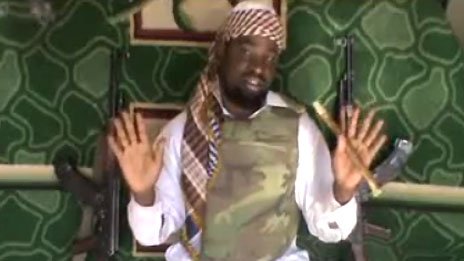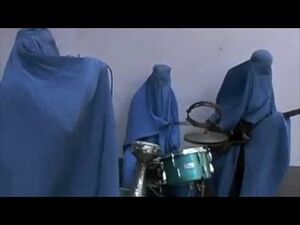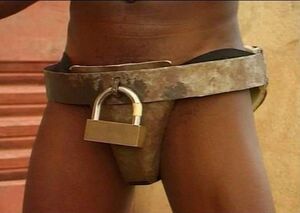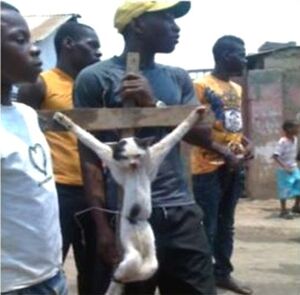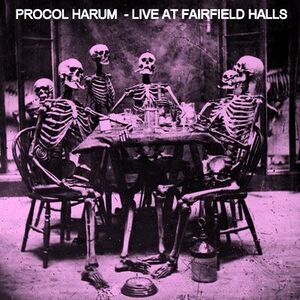Boko Haram
The Congregation for Psychedelia & Jihad, known by its Hausa name Boko Harum, are a British-West African entertainment group best known for their 1967 worldwide smash “A Whiter Shade of Pale” and their record-breaking residency in the Marquee club of Northern Nigeria at Kaduna. This residency now stretches to five years, compelling Boko Harum to forcibly abduct teenage girls to act as fans - their original fans long since having died of old age or factional violence.
Although noted for baroque and classical influences, Boko Harum’s philosophy has always included both Soul and the grittier sounds of R&B integrated with subtly poetic lyrics celebrating the lighter side of life and the virtues of unceasing interfaith warfare. Like The Beatles and the Stones before them, they were known for their soothing melding of rhythm and melody, and for the promotion of wholesale slaughter of innocents to usher in world peace. Critics have called their music "derivative" and their message "dangerously deranged" but few have disputed that their emergence from the 60s British music scene was a considerably more positive step for humanity than that of The Bee Gees.
With their music out of favour in Europe and America by the early 1980s the group reformed as a touring comedy troupe, literally slaying audiences across the West African region. They took the Mahgreb by storm, becoming the most popular form of entertainment after Mr Bean re-runs and sexual relations with livestock. In 2012 they were nominated for the Rock and Roll Hall of Fame, an institution they condemned as ungodly after failing to secure induction. By 2013 they had successfully reduced it to rubble through the cunning deployment of fans wearing suicide-flares.
Origins
Boko Harum formed in 1964 around the inspiring personality of Gary Brooker (born Gibasto Ibn Rruka) who immigrated into the United Kingdom in 1954. His parents swiftly moved from the East-end of London to Southend, drawn by the bracing sea-breezes, the self-effacing Essex charm of its inhabitants and its burgeoning Salafist coffee-shop culture. In interviews Brooker has often claimed to have known from an early age that he was destined to be an entertainer:
“I was drawn to the Working Men’s Club scene initially” he told the Toronto Moose-Botherer in 1978. “Those places were full of men smoking and drinking – ripe for conversion by the power of the Holy Word. And by the Kalashnikov.”
With automatic weaponry hard to come by in a Britain still gripped by wartime rationing, Brooker was forced to rely on his wits and the Holy Koran to make his point.
“I turned to stand-up comedy,” he told the Amsterdam Herbalist. “It seemed an easy way to gain people’s attention. All you needed to be a comic in the 60’s was a loud suit, a louder mouth and a gift for misogyny. It seemed like a career tailor-made for someone like me – before you could say Mujahadeen I was down to Burton’s having my inside leg measured and executing the queer who touched me up while doing it. I got my first gig as an emergency stand in for TV’s Fatty McGowan two days later when he was found mysteriously beheaded between Southend station and the West Essex Miner’s Welfare institute.”
Sadly for Brooker Britain seemed resistant to his brand of humour however much effort he made to stick to the comic conventions of the day. But ultimately it was this set-back that put him on the road to stardom.
“I couldn’t understand it at the time. I walked out on stage and opened with “I say, I say I say… my mother-in-law’s so fat I took her to the village elders and had her stoned to death for gluttony.” Not a titter and that was my best gag. I was so shocked I just blurted out my sign-off line “A Hindu, a Scotsman and a Jew are standing at the bar – now there’s the perfect opportunity for one hand-grenade to send three infidels to meet their judge and educate the wider community about Allah’s interdict on alcohol.” That was when the pint glasses started flying and I had to run off stage. The manager said he’d never book me again and I made sure of it by cutting off his bollocks and sewing them up in his filthy Zionist lips. I think he bled to death before the club mysteriously caught fire later on that night. I hope so, anyway, it was an act of kindness to a Godless heretic because I sealed all the fire-doors before throwing in the petrol bomb.”
It was then that Brooker had a revelation. He realised that only through music could he hope to convert the dope-smoking, free-loving long-hairs of the UK.
“I wanted to use music to show these deluded fools just what they could look forward to missing out on when we introduced Sharia law.”
Along with fellow Nigerian expats Matt Fisher (Mustafa Fa Ishmael), Ray Royer (Rizwan Al Ruwayhi) and David Knights (Abdullah Flaherty-O’Connor) Brooker entered Olympic Studios to begin recording for the newly formed Fatwa Records. Their first release, a cover of The Doors’ “Shi’ite my Fire”, gained little airplay on the BBC and failed to trouble the charts. Clearly a re-think was necessary and once again it was Brooker who came up with the goods with a double A-side Beatles tribute: “Ticket to Riyadh" and “Let Eid Be".
Having scored a top thirty hit, albeit by scraping in at number 29 for a single week, and with only minor use of threatening letters, he was able to persuade Fatwa to take a remarkable gamble. Despite the expense of a full orchestra he persuaded label executives to record his magnum opus. “A Whiter Shade of Pale” was born. In celebration he even released label executives' children unscathed from their detention in the Boko Harum tour bus. But was the wider world ready for it?
A Whiter Shade of Pale
With a melody based on Bach’s Orchestral Suite No. 3 in D Major, A Whiter Shade of Pale’s lyrics reflected Brooker’s obsession with the minutiae of the Al-Baqara Sura and his twin desire to make love to Mary Quant before cutting her throat as punishment for inventing the miniskirt. The image of Quant’s face paling as the blood drained away struck a chord with freedom lovers around the world forced to witness the meaty thighs of chubby girls whose mothers really should have told them that, like hot-pants, mini-skirts didn’t flatter their figures.
| “ | We skipped the light Fandango, Prayed with heads down on the floor. I was facing straight to Mecca, The Imam called for more. The synagogue exploded nicely, |
” |
Over the years scholars have attempted to show that this is not just another jaunty, throw-away pop-song about inter-communal pogroms in the Near East but have rarely come close to consensus on its real meaning. Whatever the real meaning of the opaque lyrics even a cursory read suggests that behind Boko Harum’s obsession with the righteous execution of recusants, all they really wanted was a little love.
The difficult second album to the modern day
The band had hoped that fame would allow them to spread their message more easily. To their frustration, however, they found that press-attention made the surreptitious slaying of unbelievers harder to keep quiet. Roy Royer found this particularly hard to take. He had recently come to share the views of Ibn Masood that Luqman 31:6 specifically condemns those who listen to music to everlasting torments of Hellfire. Unable to put an end to the miserable lives of the sinners in the audience with reporters watching from the press-gallery, Royer became so frustrated that his band-mates were compelled to strap his arms to his side to stop him murdering himself for his part in creating the evil music. Critics noted that this had a negative effect on his drumming.
With touring becoming impossible the band returned to the studio but with disappointing results. Religious strictures prevented the consumption of magic mushrooms during Ramadan making inspiration hard to come by. The next four months saw a flurry of single releases; “Fight for your right (to Purdah)”, “Sympathy for the Dervish” and “The Sunni’s got his hat on”. Disappointingly, none reached that upper echelons of the chart and the band began to concentrate on other ways to spread the Good News. Fomenting violence across North Africa, importing Soviet automatic weaponry into Mauritania and forcibly exiling Christians from Yobe province distracted them for a number of years but, though still excited by their new comedic direction, the constant need to be on the road got to them. It was a classic case of Rock and Roll fatigue.
“We’d finish raising some dusty village in Jigawa to the ground at maybe midnight on a Tuesday and then there was scarcely the time to rape the local nuns before we’d be back on the bus and heading for Kebi.” Brooker admitted in his autobiography, Songs in the Key of Death.
“You never knew where you were or who you were killing. We were in Sokoto one day and no sooner had I staved in the head of some toddler and forced his animist parents to eat his internal organs than I had to crucify a bunch of altar-boys. For the first time I realised my heart was no more I n touring than the animist kid’s heart was in his thorax. You really can have too much of a good thing.”
Eventually it all came to a head with an argument over whether to spend more time detonating the mentally ill in crowded marketplaces or car-bombing religious parades. In retrospect, it was perhaps inevitable the band would have to split up due to destructive differences.
“We officially went our separate ways on June 21st 2010. I went off to Somalia to retrain with Al-Shabab, Matt, Ray and David went in a million different directions as a result of the RPG I sent through the window of their limo. Splitters never prosper!”
However, fans need not despair as recent exciting developments in Nigeria suggest that, though still tired of the constant drag of touring and finding audiences increasingly difficult to come by (“dead punters make shit repeat-purchasers as far as concert tickets are concerned”) Brooker has found an innovative new way to reach an audience. A spokesman for his management have confirmed;
“As of May 2014, Boko Harum have committed to forcibly rounding up audiences from scattered girls' boarding schools across the northern provinces. It is hoped that this way Gary can reach and exterminate a whole new generation of admirers.
| Featured version: 15 July 2014 | |
| This article has been featured on the main page. — You can vote for or nominate your favourite articles at Uncyclopedia:VFH. | |
